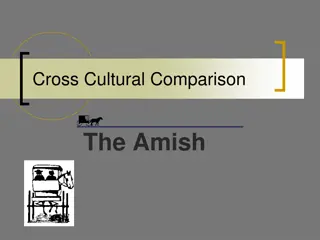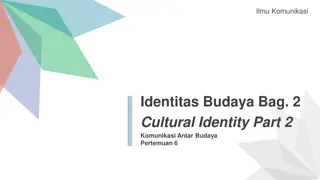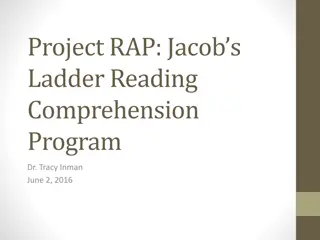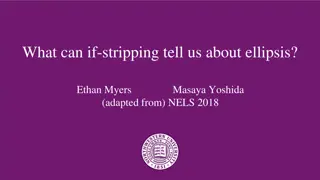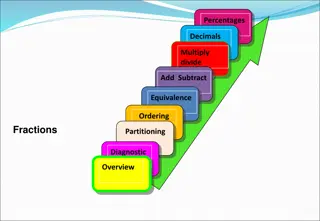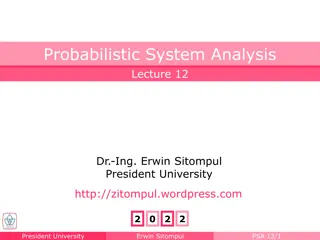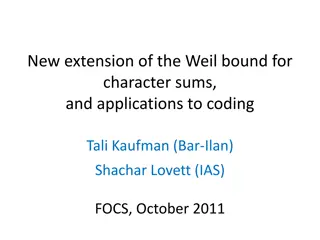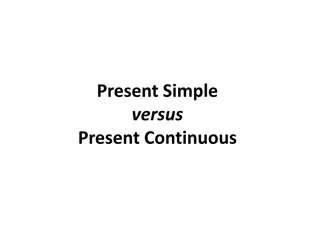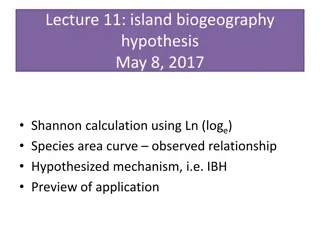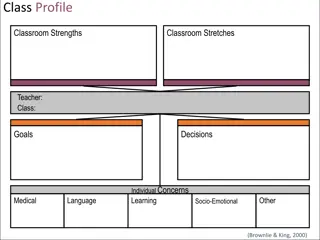Comparative Sociology
Comparative Sociology is a specialized branch that compares societies to provide generalizations, focusing on the structure and jurisdiction of groups and organizations. It involves studying affinities and disparities to predict outcomes. The discipline is closely related to Social Anthropology. Com
3 views • 15 slides
Interpretation
Interpretation in research methodology involves drawing inferences from collected data, establishing continuity in research, and developing explanatory concepts for future studies. It helps researchers understand abstract principles, make predictions, and maintain research continuity. Interpretation
2 views • 5 slides
Understanding Generalization: Facts, Opinions, and Validity
Exploring the concept of generalization, this content distinguishes between facts, opinions, and valid generalizations. It emphasizes how generalizations are broad statements based on information and experiences, while facts can be proven true and opinions are belief-based. Key words and examples ar
1 views • 8 slides
Understanding Generalizations and Differentiating Between Valid and Faulty Ones
Generalizations are broad statements about groups of people or things sharing common traits. While some generalizations can be valid, supported by facts and logic, others may be faulty, lacking evidence and prone to inaccuracies. It's essential to use clue words like "all," "always," and "never" cau
1 views • 10 slides
Embracing Religious Pluralism for a Harmonious Society
Educate yourself on world religions and religious oppression, empathize with religious minorities, combat generalizations, and promote belief inclusion in all aspects of life for a more just and peaceful world.
0 views • 6 slides
Understanding the Amish: A Cross-Cultural Comparison
Cross-cultural studies involving the Amish explore their origins as descendants of 16th-century Anabaptists, their unique religious beliefs, and customs. Learn about the importance of avoiding ethnocentrism and making generalizations when studying different cultures. Delve into the Amish community's
0 views • 33 slides
Understanding the Impact of Stereotypes on Intercultural Communication
Stereotyping is a complex form of categorization that simplifies perceptions into broad categories, affecting how we interact with different cultural groups. Stereotypes are learned through socialization processes, media influence, and other factors, leading to filters that hinder effective communic
3 views • 17 slides
Unveiling the Wisdom of Proverbs: A Treasure Hunt for Nobility
Delve into the rich tapestry of Proverbs with Jason S. DeRouchie, PhD, as he leads you on a quest for wisdom and nobility. Explore the poetic and memorable nature of Proverbs, discovering the timeless truths hidden within each proverbial bite. Gain insights into the art of deciphering these pithy sa
0 views • 42 slides
Understanding Low Threshold Rank Graphs and Their Structural Properties
Explore the intriguing world of low threshold rank graphs and their structural properties, including spectral graph theory, Cheeger's inequality, and generalizations to higher eigenvalues. Learn about the concept of threshold rank, partitioning of graphs, diameter limits, and eigenvectors approximat
0 views • 22 slides
Understanding Word Roots: Origins and Meanings in English Language
Explore the fascinating world of word roots in the English language with this comprehensive review. Discover the significance of word parts, generalizations, and application in various contexts, from drama and opera to privilege and prejudice. Uncover the relationships between root words and their d
0 views • 17 slides
Automatically Generating Algebra Problems: A Computer-Assisted Approach
Computer-assisted refinement in problem generation involves creating algebraic problems similar to a given proof problem by beginning with natural generalizations and user-driven fine-tuning. This process is useful for high school teachers to provide varied practice examples, assignments, and examin
0 views • 16 slides
Understanding Sampling in Social Research Methods
Sampling in social research involves selecting a portion of a population to draw conclusions about the entire group. It helps save time, money, and allows for accurate measurements. The key principles of sampling include systematic selection, clear definition of sample units, independence of units,
0 views • 19 slides
Jacobs Ladder Reading Comprehension Program Overview
Jacobs Ladder Reading Comprehension Program, developed by Dr. Tracy Inman, provides students with a structured approach to enhance their critical thinking skills in reading. The program consists of six skill ladders, each focusing on different components like sequencing, cause and effect, generaliza
0 views • 25 slides
Insights into Ellipsis from If-Stripping Analysis
If-stripping, a construction related to bare argument ellipsis, sheds light on the interpretational aspects of ellipsis in language. The presentation delves into terms, derivation, and implementation of stripping, highlighting how it can provide valuable insights into the nature of ellipsis structur
0 views • 33 slides
Mastering Numbers: Strategies and Concepts
Develop computation strategies applicable to any number, including generalizations of numerical relationships and operations. Explore arithmetic operations, equality concepts, problem-solving strategies, mathematical proof, percentages, and comparisons of fractions, decimals, and percentages. Enhanc
0 views • 20 slides
Statistical Inference and Estimation in Probabilistic System Analysis
This content discusses statistical inference methods like classical and Bayesian approaches for making generalizations about populations. It covers estimation problems, hypothesis testing, unbiased estimators, and efficient estimation methods in the context of probabilistic system analysis. Examples
0 views • 30 slides
New Extension of the Weil Bound for Character Sums
Tali Kaufman and Shachar Lovett present a new extension of the Weil bound for character sums, providing applications to coding theory. The Weil bound offers insights into the behavior of low-degree polynomials, distinguishing between structured and random-like functions. This extension has implicati
0 views • 28 slides
Understanding the Difference Between Present Simple and Present Continuous Tenses
Present Simple and Present Continuous tenses serve different purposes in English grammar. The Present Continuous is used for actions happening at the moment, longer actions in progress, and future plans. On the other hand, the Present Simple is used for repeated actions and facts/generalizations. Re
0 views • 18 slides
The Deceptive Beauty of Discounted Expected Utility: A Study on Optimizing Over Multiple Components
This study delves into the intricate world of discounted expected utility, exploring various axioms, generalizations, variations, and applications. It questions the row-first versus column-first approach and discusses preferences over outcome streams and lotteries. The investigation leads to profoun
0 views • 44 slides
Understanding Gender Stereotyping and its Impact
Gender stereotyping involves widely accepted biased beliefs about individuals based on their gender, leading to unfair treatment. It encompasses generalizations about personality traits, domestic behaviors, occupations, and physical appearance, which can have detrimental effects on both men and wome
0 views • 9 slides
Island Biogeography Hypothesis and Species-Area Curves Overview
Explore the Island Biogeography Hypothesis through Shannon calculations and Species-Area Curve observed relationships. Learn about the mechanisms of island biodiversity, generalizations of species richness, and equilibrium concepts. Discover how area size influences species diversity and the impact
0 views • 24 slides
Mastering Persuasive Writing Techniques for NAPLAN Success
Learn how to identify and apply persuasive writing devices such as emotive language, rhetorical questions, superlative adjectives, and generalizations in your writing to effectively sway your audience. Enhance your persuasive skills and excel in your NAPLAN assessments with these powerful techniques
0 views • 44 slides
Exploring Linear Relationships in Grade 8/9 Math Curriculum
Delve into the world of linear relationships in Grade 8/9 Math curriculum, where students learn to identify, represent, analyze, and apply two-variable linear equations. Through a variety of activities and goals focused on reasoning, communication, and self-regulation, students develop a deep unders
0 views • 7 slides
Understanding Fixpoint Equations in Programming Languages
Fixpoint equations play a crucial role in programming languages for solving mutually recursive problems like parsing and dataflow analysis. This content explores the concepts of fixpoint equations, assumptions for ensuring solutions, computing solutions, and generalizations for cases with greatest e
0 views • 31 slides





